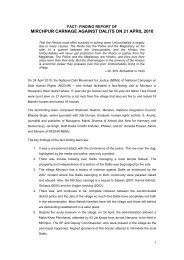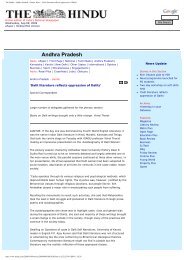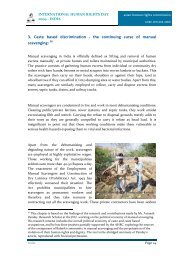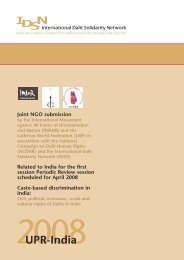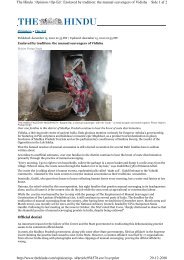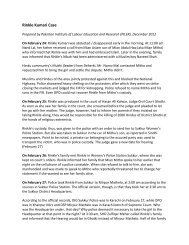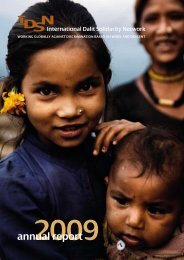equal by law, unequal by caste - International Dalit Solidarity Network
equal by law, unequal by caste - International Dalit Solidarity Network
equal by law, unequal by caste - International Dalit Solidarity Network
You also want an ePaper? Increase the reach of your titles
YUMPU automatically turns print PDFs into web optimized ePapers that Google loves.
Vol. 26, No. 2 Equal <strong>by</strong> Law, Un<strong>equal</strong> <strong>by</strong> Caste 293scheduled tribes; denying right of passage to a place of public resort; andusing a position of dominance to exploit a scheduled <strong>caste</strong> or scheduledtribe woman sexually. 2083. ADDITIONAL SOCIAL WELFARE LEGISLATIONIn addition to the acts described above, a number of otherstatutes aim to eradicate exploitative labor arrangements in which <strong>Dalit</strong>sare frequent victims. The Employment of Manual Scavengers andConstruction of Dry Latrines (Prohibition) Act, 1993, prohibits theemployment of manual scavengers or the construction of dry (non-flush)latrines and punishes such offenses with imprisonment and/or a fine. 209The Bonded Labour System (Abolition) Act, 1976, seeks to abolish allagreements and obligations arising out of the bonded labor system,release all laborers from bondage, prohibit the creation of new bondageagreements, and order the economic rehabilitation of freed laborers <strong>by</strong>the state. 210 Other relevant acts include the Inter State Migrant Workmen(Regulation of Employment and Service Conditions) Act, 1979, 211 theChild Labour (Prohibition and Regulation) Act, 1986, 212 the MinimumWages Act, 1948, 213 and the Equal Remuneration Act, 1976. 214C. ECONOMIC DEVELOPMENT MEASURESThe government of India has also attempted to increase the selfsufficiencyof the scheduled <strong>caste</strong> population through financial assistance208 The Scheduled Castes and the Scheduled Tribes (Prevention of Atrocities) Act, No. 33 of 1989, §3.209 The Employment of Manual Scavengers and Construction of Dry Latrines (Prohibition) Act, No.46 of 1993.210 Bonded Labour System (Abolition) Act (1976). Under the Act, payment of less than minimumwage for the purposes of working off a debt also amounts to bondage. Id.211 <strong>Dalit</strong> migrant laborers are seldom paid minimum wage. They work long hours, live in subhumanconditions and may face physical abuse if they try to escape their place of work. NHRCREPORT, supra note 110, at 78.212 The Act prohibits the employment of children in particular industries, while regulating theconditions of their work in other industries.213 The Minimum Wages Act only regulates employers who employ more than 1,000 workers. TheMinimum Wages Act, No. 11 of 1948, § 3(1A), cited in NHRC REPORT, supra note 110, at 81.214 The Act requires equity in the payment of wages between men and women employed to performthe same or similar work. Equity cannot be achieved <strong>by</strong> reducing the wages of the higher paidworker. Employers are also prohibited from discriminating on the basis of sex in recruitment,hiring, or promotion. The Act is especially significant for <strong>Dalit</strong> women who frequently get paidless than their male counterparts. See supra note 91.



